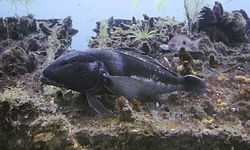Blue cod
| Blue cod Parapercis colias | |
|---|---|
.jpg) | |
| Scientific classification | |
| Kingdom: | Animalia |
| Phylum: | Chordata |
| Class: | Actinopterygii |
| Order: | Perciformes |
| Family: | Pinguipedidae |
| Genus: | Parapercis |
| Species: | P. colias |
| Binomial name | |
| Parapercis colias Forster, 1801 | |
- Blue cod is also a common name for Anoplopoma fimbria (sablefish) in the UK.
Blue cod, Parapercis colias, is a temperate marine fish of the family Pinguipedidae. It is also known variously as Boston blue cod, New Zealand cod, sand perch or its Māori names rawaru and pakirikiri.
It is exclusively found in New Zealand in shallow waters around the rocky coasts of up to the depth of 150 m, though it is far more common south of Cook Strait. It is bluish green to blue black above with white toward the belly. Large examples are usually greenish blue in coloration, while smaller ones are blotched in varying shades of brown. An adult may grow to 60 cm in length and weigh from one to three kg. It feeds mainly on small fish and crabs. Blue cod is strongly territorial. Spawning takes place in southern spring. Blue cod can also change sex from female to male.
It is a plump fish which produces good fillets, but it has a very low oil content. It can be served battered, crumbed, pan-fried or baked. It is an important recreational species in the South Island and is commercially harvested. Blue cod populations are managed sustainably under New Zealand’s fisheries quota management system, although are becoming scarce in some small areas due to fishing pressure. Annual catch range is between 1,300 to 2,000 tonnes.

References
- "Parapercis colias". Integrated Taxonomic Information System. Retrieved 30 January 2006.
- Froese, Rainer and Pauly, Daniel, eds. (2005). "Parapercis colias" in FishBase. 10 2005 version.
External links
- Blue Cod Fishing and a link to the Blue Cod Fishing Regulations. Ministry of Fisheries.